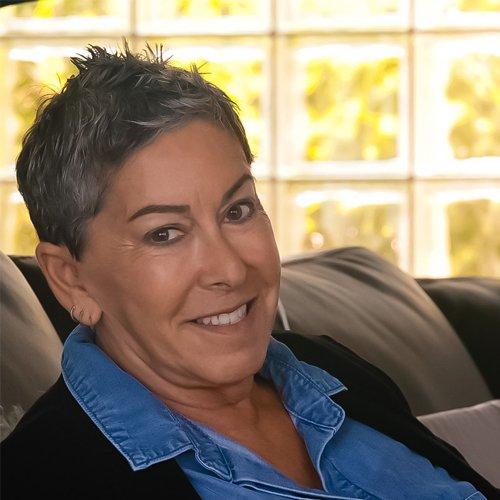“The outcome for this cancer is not going to be good,” Abby Kanarek told her boyfriend. “And I don’t want to put you through that. You need to find someone else.”
It was March 2019. They’d begun a wonderful relationship 10 months earlier, and they were about to leave on a dream trip to Southeast Asia.
“You know what?” he told her. “I'm staying. I'm going to step up to the plate and be the person that you think I am.”
That was the first joyful moment for Kanarek since a devastating diagnosis blindsided her.
It had all started with a backache — a recurring problem because of her scoliosis. She went to the doctor for an epidural, but her insurance required an X-ray for payment.
That’s when they found a mass on her lung.
Kanarek, who lives in Laguna Beach, California, made an appointment with an oncologist at an Orange County medical center — then took a fall one night getting up from the couch. Her leg had gone completely numb, if only for a short time.
“A day later, I was having dinner with a friend, and I noticed my hand-body coordination was a little off,” she said. “The next morning when I woke up, I couldn’t move the entire left side of my body.”
An ambulance took her to a local trauma center, where scans revealed not only the mass in her chest, but another large mass and five smaller ones in her brain.
They tried to biopsy the lung mass, but there was so much necrotic tissue they failed to get a sample. The main priority, though, was removing the large brain tumor. A biopsy could be taken from that.
The diagnosis was nonsmall cell PD-L1 positive lung cancer that had metastasized to the brain. Kanarek had GammaKnife radiation to destroy the remaining smaller brain tumors, then something had to be done about the tumor in her lung.
At 60, Kanarek is a dynamic woman who’d been successful in a variety of businesses — and at this point she took charge of the situation. She’d been seeing a general oncologist, but wanted to find someone who specialized in lung cancer.
After getting opinions from other cancer institutes and researching doctors on her own, she decided on Ravi Salgia, M.D., Ph.D., the Arthur & Rosalie Kaplan Chair in Medical Oncology at City of Hope, known for his expertise in lung diseases.
Targeted Immunotherapy
“From my first day at City of Hope, I knew things would be different,” she said. “A woman named Lupe Santana, who’s one of the patient coordinators there, met me and walked me through the entire day and everything that was going to happen.”
She also had her first meeting with Salgia.
“He is totally earnest, honest, educated and compassionate,” she said. “He listens, and he explains things in a very linear, no BS fashion that really appeals to my brain.”
Salgia recalled that first meeting, when he told her about City of Hope’s focus on personalized, precision medicine tailored to each individual.
“I found her to be a very energetic woman, who was asking good questions and looking for answers,” he said. “I explained that while we had to be aggressive in our approach, we also had to think about the specific characteristics of her cancer, about any genetic or protein abnormalities, and whether there might be targeted therapies available.”
Further testing showed that the concentration of PD-L1 in Kanarek’s cancer cells was 90%, which made her a good candidate for an immunotherapy that specifically targeted it.
PD-L1 is a protein whose normal function is to stop the immune system’s T cells from attacking the body’s own cells, thus preventing autoimmune diseases. But a large amount of PD-L1 in cancer cells can also keep the immune system from attacking the cancer, leaving it free to grow and spread.
A drug called pembrolizumab (Keytruda), an immune checkpoint inhibitor, was designed to stop the action of PD-L1 so that the immune system can destroy the cancer.
The plan was to keep Kanarek on Keytruda for two years, and the first two treatments went well. But after the third and fourth, she suffered serious side effects.
Her liver and kidneys became inflamed, and she was immediately put on steroids. That took care of the inflammation, but her severe side effects also ended the Keytruda infusions.
Is There a Positive Side to Side Effects?
Despite cutting off immunotherapy, the results Kanarek had after only four treatments, were nothing short of amazing. Keytruda had killed off the cancer in her lung.
“She’s doing great,” said Salgia. “Here we are, two years later, and she is still in remission.”
It seemed extraordinary that a course of treatment prescribed for two years could be that effective after only a few months. But Salgia and his colleagues have just published a study in the journal Cancers that discusses that phenomenon.
“We're finding that the patients who developed toxicities actually have a better survival. Who would have thought that?” he said. “Biologically, the immune system is so involved, it's fighting some of the normal cells as well as the cancer cells.”
The Team Approach to Cancer Care
One of the things that Kanarek appreciates most about City of Hope is the team of professionals looking after her physical and emotional health.
Her multidisciplinary team, quarterbacked by Salgia, includes a radiation oncologist who can zap any suspicious spots that might appear on her regular scans, a nephrologist for her kidneys, a gastroenterologist for her liver and psychological counselors who can provide emotional support.
“City of Hope is like my Disneyland, with occasional nausea attached,” she quipped.
Still, she doesn’t want to give the impression that cancer is a cakewalk.
“I don’t like using the word ‘journey’ because I’m not going anywhere on a cruise,” she said. “This was a real challenge.”
Today, though, you’d have to describe her as a happy woman. She and her boyfriend, Richard Epstein, were married on June 11. They’ll be traveling to New York soon to see her son and his fiancée, take in a few shows, and celebrate their marriage with East Coast friends and family.
And one day soon, she and Epstein hope to take that exotic dream trip they had to postpone.
Kanarek also looks forward to the opening of the new City of Hope cancer center in Irvine, which is closer to home. She plans on getting her scans and infusions there, but will continue making the trip to Duarte to see the practitioners on her team.
“I have a crush on every single one of my doctors,” she said.


